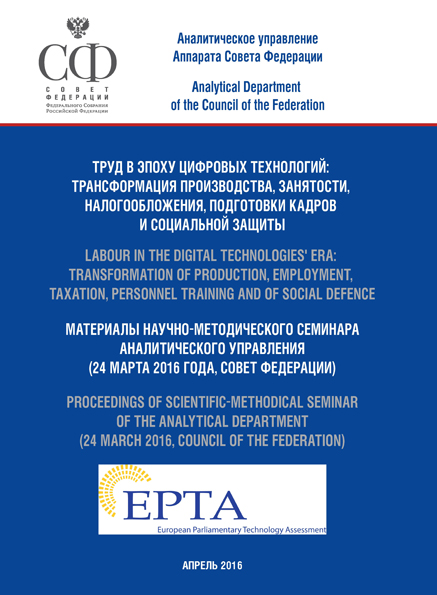
Дата публикации: 25 апреля 2016
№ 617-18
Материалы Научно-методического семинара Аналитического управления (Совет Федерации, 24 марта 2016 года)
Proceedings of Scientific-methodical seminar of the Analytical Department (24 March, 2016, Council of the Federation)
21 век – эпоха стремительного развития и внедрения в повседневную жизнь разнообразных цифровых технологий. Распространение мобильных телекоммуникационных устройств, создание дистанционных рабочих мест, ведение территориально распределенного бизнеса в режиме online, роботизация производств – все это заставляет эволюционировать трудовые отношения, возникающие между работодателем и работником.
Новые технологии делают возможным совместный труд большого числа людей в сети Интернет (включая краудсорсинг). Все это меняет традиционные отраслевые структуры и рынки, влечет за собой необходимость перемен в образовании, в системе социального обеспечения, в работе фискальной системы. Возникают и новые проблемы, связанные с защитой информации, персональных данных, безопасностью частной жизни.
Трансформация трудовых отношений, прежде всего, происходит в высокотехнологичных отраслях. Сегодня среди актуальных задач законодательных органов власти – стимулирование развития высоких технологий и инновационных производств, однако с учетом того, чтобы избежать проблем и препятствий, возникающих в ходе бурного распространения цифровых технологий.
Различные аспекты этой темы активно обсуждаются в Совете Федерации. Аналитическое управление Аппарата Совета Федерации разрабатывает данную тему с привлечением экспертов, представителей органов исполнительной власти и гражданского общества. 24 марта 2016 года состоялся Научно-методический семинар Аналитического управления на тему «Труд в эпоху цифровых технологий: трансформация производства, занятости, налогообложения, подготовки кадров и социальной защиты». В данном издании использованы материалы семинара.
В качестве ассоциированного члена Европейской парламентской сети оценки технологий (ЭПТА) Аналитическое управление установило многостороннее взаимодействие с исследовательскими центрами, входящими в данную организацию. Оно участвует в разработке темы ежегодного доклада и конференции ЭПТА в 2016 году, которые будут связаны с будущим трудовых отношений в цифровую эпоху – в условиях всеобщей компьютеризации, распространения мобильных платформ-приложений, «шеринг-экономики» и других новых способов ведения производства и бизнеса.
Содержание:
Л.Н. Бокова, заместитель председателя Комитета Совета Федерации по конституционному законодательству и государственному строительству, председатель Временной комиссии Совета Федерации по развитию информационного общества
Современные цифровые технологии: новые задачи для законодателей
С.П. Сергеев, заместитель директора Департамента условий и охраны труда Министерства труда и социальной защиты Российской Федерации
Информационные технологии в области специальных условий труда
С.Б. Алиев, исполняющий обязанности директора Департамента трудовой миграции Евразийской экономической комиссии, профессор
Трудовая миграция в рамках Евразийского экономического союза
В.Б. Салуянов, руководитель аппарата Общероссийской общественной организации «Российский союз инженеров»
Информационно-технологическая революция (внедрение систем с искусственным интеллектом, замена людей роботизированными системами) и ее последствия для занятости населения и стабильности общества
Ю.В. Малкова, доцент кафедры «Налоги и налогообложение» ФГОБУ ВО «Финансовый университет при Правительстве Российской Федерации»
Проблемы налогообложения трудовых доходов физических лиц, полученных в сети Интернет
А.В. Морозов, заведующий кафедрой информационного права, информатики и математики Всероссийского государственного университета юстиции (РПА Минюста России)
Защита персональных данных при использовании электронных документов
____________
21st century is the era of rapid development and implementation of various digital technologies. The ubiquity of mobile telecommunications devices, the creation of remote workplaces, and the introduction of geographically distributed business online, robotization of production – all this makes the employment relationships arising between employer and employee to be forced to evolve.
New technologies allow the joint work of a large number of people on the Internet (including crowdsourcing). All this changes the traditional industrial structure and markets, characteristics of labour, particularly in such areas as tourism, mobility, trade, software production. There appear also new challenges associated with information security, personal data protection, and security of private life.
The transformation of labour relations takes place primarily in high-tech industries. The stimulation of high technology development and innovative industries growth is among the topical issues of the legislature today. However, it is necessary to avoid problems and obstacles that arise in the course of rapid dissemination of digital technologies.
Various aspects of this theme are actively discussed in the Council of the Federation. Analytical Department of the Council of the Federation develops the topic together with experts, representatives of executive authorities and civil society. A Scientific-methodical seminar of Analytical Department on the topic of «Labour in the digital technologies' era: transformation of production, employment, taxation, personnel training and of social defence» was held on 24 March, 2016. In this publication the materials of the seminar are used.
Analytical Department, as an associated member of the European Parliamentary Technology Assessment (EPTA), has established multilateral cooperation with research centers which are members of this organization. It contributes in the development of the topic in the frames of the annual report preparation of EPTA in 2016. The report and annual conference will be devoted to the future of labour relations in the digital age – in the conditions of global computerization, the proliferation of mobile platforms, applications, implementation of «sharing economy» and other new ways of doing production and business.
CONTENTS
L.N. Bokova, Deputy Chairman of the Council of the Federation Committee on Constitutional Legislation and State-building, Chairman of the Temporary Commission of the Council of the Federation on information society development
Modern digital technologies: new challenges for lawmakers
S.P. Sergeev, Deputy Director of the Department of environment and labour protection of the Ministry of labour and social protection of the Russian Federation
Information technologies in the sphere of special working conditions
S.B. Aliev, the acting Director of the Department of labour migration of the Eurasian Economic Commission, Professor, academician of the Russian Academy of natural sciences
Labor migration within the Eurasian Economic Union
V.B. Saluyanov, the Chief of staff of the Russian public organization «Russian Union of engineers»
Information-technological revolution (implementation of systems with artificial intelligence replacing humans with robotic systems) and its implications for employment and stability of society
U.V. Malkova, associate Professor of Department «Taxes and taxation» of Financial University under the Government of the Russian Federation
Problems of taxation of labour income of natural persons received on the Internet
А.V. Morozov, Head of the Department of informational law, Informatics and mathematics of the Russian state University of justice
The protection of personal data when using electronic documents